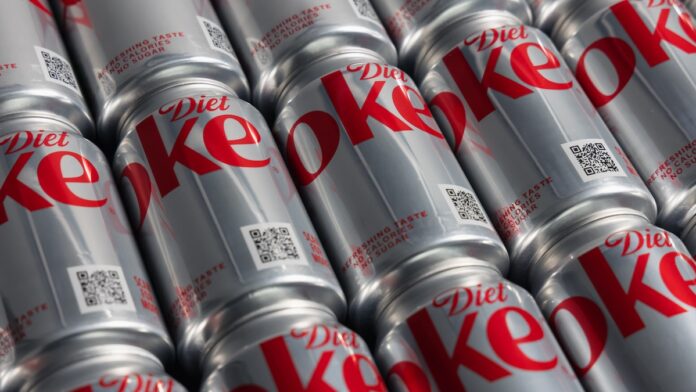One of the biggest derailers in your quest to lose weight and keep it off may be those foods and drinks labeled “diet.” A recent story in Time links diet soda, for example, to increased risk for stroke, coronary heart disease, and heart attack. The other issue is stocking up on faux sugar-laden beverages and frozen or shelf-stable diet treats that might not be the automatic weight loss you thought they’d be. They may cause you to gain more weight. The Nutrients Journal reported that “artificial sweeteners have side effects in terms of obesity, cardiovascular disease, and mortality.”
The Trouble with Artificial Sweeteners
“Artificial sweeteners are sugar substitutes that provide high sweetening power associated with low accompanied calories,” according to Cureus. “These additives are known for their intense sweetness, often multiple times sweeter than sugar, allowing for smaller amounts to be used to achieve the desired level of saccharinity.”
Products containing artificial sweeteners are often advertised as healthier alternatives to traditional sodas and juices. Because they do not contain sugar, they are assumed not to lead to weight gain.
They work because they trick the brain into thinking it’s consuming sugar. As a result, they leave some people feeling less satisfied. One study reported that when we are obese or are overweight and drink diet soda, we are more likely to consume more calories at meals and snacks than our counterparts who drink sugar-sweet beverages. So, we gain weight.
The Yale Journal of Biology and Medicine stated that “While people often choose “diet” or “light” products to lose weight, research studies suggest that artificial sweeteners may contribute to weight gain.” The Journal also noted, “Several large-scale prospective cohort studies found a positive correlation between artificial sweetener use and weight gain.”
The American Journal of Clinical Nutrition found that “sucrose and saccharin consumption led to increased body weight.” Artificial sweeteners can cause changes in portions of the gut microbiome.
Industry Growth to Meet Consumer Demand
“Consumers are demanding a greater variety of low-calorie products as they strive to make healthier food choices.” according to the Journal of Pharmacology & Pharmacotherapeutics. This is leading to the popularity of products containing artificial sweeteners. These products include aspartame, saccharin acesulfame potassium, sucralose, neotame, and advantame. The Journal reported that their value to weight loss journeys may be overstated. “AS have been increasingly used as healthier alternatives to sugar-sweetened products to curb the obesity epidemic. However, the evidence supporting their weight reduction or maintenance use has been inconclusive.
The World Health Organization has warned the public against including non-sugar sweeteners (NSS) in one’s diet.
“Replacing free sugars with NSS does not help with weight control in the long term. People need to consider other ways to reduce free sugar intake, such as consuming food with naturally occurring sugars, like fruit, or unsweetened food and beverages,” said Francesco Branca, WHO Director for Nutrition and Food Safety.
Branca added that those seeking to lose weight should work on minimizing the sweetness of their diet altogether instead of finding solutions to access sweetness without sugar.
“NSS are not essential dietary factors and have no nutritional value. People should reduce the sweetness of the diet altogether, starting early in life, to improve their health,” he said.
The Journal of Family Medicine and Primary Care stated that artificial sweetening agents “have shown a paradoxical, negative effect on blood glucose” and that “this increases the levels of insulin in the blood, eventually leading to decreased receptor activity.” This should be taken into consideration when making decisions at the grocery store.
Consider These Alternatives to Artificial Sweeteners
- Unsweetened Teas. Skip out on the false sweeteners and steep some tea for a long time to enhance the flavor. Hibiscus or lavender tea can imitate that bubbly pop you’re used to pouring in your favorite tumbler.
- Sparkling or Flat Water. Add a citrus twist to your sparkling water or seltzer if you want some zest in your beverage. A few slices of ginger or a scoop of nutmeg can also add something special.
- Add Some Herbs. Thyme, mint, or rosemary are great ways to give water or another sugar-free beverage a kick. If you don’t like the taste of herbs in your drink, strain them out for a smooth effect.







